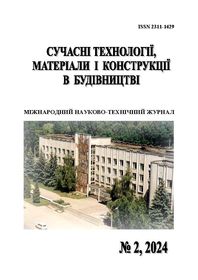ЕФЕКТИВНІСТЬ ВИКОРИСТАННЯ ВІДХОДІВ ПРОМИСЛОВОСТІ ТА БУДІВНИЦТВА ДЛЯ ВИРОБНИЦТВА СУХИХ БУДІВЕЛЬНИХ СУМІШЕЙ
DOI:
https://doi.org/10.31649/2311-1429-2024-2-45-51Ключові слова:
сухі будівельні суміші, промислові відходи, зола-винесення, бетонний бій, вторинна сировина, мінеральні наповнювачі, реологія, міцність, екологічна ефективність, сталий розвитокАнотація
У статті представлено результати теоретичних і експериментальних досліджень ефективності використання відходів промисловості та будівництва для виробництва сухих будівельних сумішей (СБС). Досліджено фізико-хімічні властивості золи-винесення ТЕС, доменних шлаків, бетонного та цегляного бою, їх вплив на реологічні характеристики, міцність і експлуатаційні властивості СБС. Проведено розробку оптимальних складів сумішей із використанням вторинної сировини, що дозволяють досягти збалансованого поєднання технічних характеристик, економічної ефективності та екологічної безпеки. Експериментально підтверджено, що вторинні компоненти здатні формувати щільну структуру цементного каменю, підвищувати тріщиностійкість, зменшувати водопоглинання та підвищувати міцність на стиск і згин. Показано, що включення до 30% промислових і будівельних відходів дозволяє знизити вуглецевий слід виробництва СБС на 15–20%, скоротити споживання природної сировини та обсяги утворення відходів. Запропоновано технологічну схему підготовки вторинних матеріалів і рецептури сумішей на їх основі. Виявлено оптимальні співвідношення вторинних компонентів (зола-винесення, бетонний та цегляний бій), які забезпечують максимальну ефективність за комплексом фізико-механічних властивостей. Результати досліджень доводять доцільність широкого впровадження вторинної сировини у виробництво СБС в умовах сталого розвитку будівельної галузі. Окремо розглянуто екологічні та економічні переваги запропонованого підходу, визначено напрями подальших досліджень щодо удосконалення складів СБС залежно від регіональної сировинної бази.
Посилання
L. Y. Dvorkin, K. K. Pushkaryova, O. L. Dvorkin, and M. O. Kochevykh, "Use of Technogenic Products in Construction: Textbook," Rivne: NUVHP, 2009, 330 p.
2. M. V. Sukhanevych, "Waste Management and Its Use for Producing Construction Materials: Textbook," Kyiv: KNUBA, 2011, 152 p.
Y. G. Hasan, M. A. Mokhort, and M. V. Sukhanevych, "Building Materials from Waste of the Fuel-Energy, Mining, and Processing Industries: Lecture Notes," Kyiv: KNUBA, 2009, 60 p.
Y. G. Hasan and M. A. Mokhort, "Recycling Waste from Ferrous and Non-Ferrous Metallurgy and the Fuel Industry into Construction Materials: Lecture Notes," Kyiv: KNUBA, 2008, 44 p.
L. Y. Dvorkin and A. V. Mironenko, "Building Materials and Products Using Industrial Waste: Textbook," Rivne: NUVHP, 2019, 298 p.
K. K. Pushkaryova (Ed.), "Modern Ukrainian Building Materials, Products, and Structures: Scientific and Practical Reference Book," Kyiv: Association "VSVBMV," 2012, 664 p.
L. Y. Dvorkin, V. V. Zhitkovskyi, and V. V. Marchuk, "Efficient Dry Building Mixtures and Mortars Based on Them: Monograph," Kyiv: Karavela, 2024, 348 p.
R. F. Runova and Y. L. Nosovsky, "Technology of Modified Building Mortars," Kyiv, Ukraine: KNUBA, 2007.
A. V. Bondar, "Effective Dry Building Mixtures for Flooring Elements of Civil Buildings," Ph.D. dissertation, Vinnytsia National Technical University, Vinnytsia, 2019.
A. V. Bondar, V. P. Kovalskyi, V. P. Burlakov, and Ye. R. Matviychuk, "Utilization of Industrial Waste by Manufacturing Dry Building Mixtures," Ecological Sciences: Scientific and Practical Journal, no. 3 (22), pp. 21–24, 2018.
A. V. Bondar, N. Y. Irodova, and O. V. Bondar, "Efficiency of Using Local Materials and Industrial Waste for the Production of Dry Building Mixtures," LIV All-Ukrainian Scientific and Technical Conference of the Faculty of Civil, Construction and Environmental Engineering, Vinnytsia, Ukraine, March 24–27, 2025. [Online]. Available: https://conferences.vntu.edu.ua/index.php/all-fbtegp/all-fbtegp-2025/paper/view/24493/20245
DSTU B V.2.7-126:2011. Modified Dry Building Mixtures. General Technical Specifications. Effective from 2011-06-01. Official ed. Kyiv: Ministry of Regional Development and Construction of Ukraine, 2011, 42 p.
##submission.downloads##
-
pdf
Завантажень: 68
Опубліковано
Як цитувати
Номер
Розділ
Ліцензія

Ця робота ліцензується відповідно до Creative Commons Attribution 4.0 International License.


